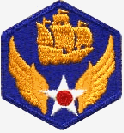
VI BOMBER COMMAND
IN DEFENSE OF THE PANAMA CANAL
1941 - 45

VI Bombardment Command History:
Unit Histories:
6th BGp (Heavy)
3rd BS (Heavy)
29th BS (Heavy)
74th BS (Heavy)
397th BS (Heavy)
9th BGp (Heavy)
1st BS (Heavy)
5th BS (Heavy)
99th BS (Heavy)
430th BS (Heavy)
25th BGp (Medium)
12th BS (Medium)
35th BS (Medium)
59th BS (Medium)
417th BS (Medium)
40th BGp (Heavy)
25th BS (Heavy)
44th BS (Heavy)
45th BS (Heavy)
395th BS (Heavy)
Units Attached to VI Bomber Command
10th BS (Heavy)
15th BS (Light)
Crew Pictures:
U-Boat Sinkings:
Aircraft Crashes:
Home:
Air Force Song - History and More
Provided by the USAF Heritage of America Band
History of the Air Force Song
In 1938, Liberty magazine sponsored a contest for a spirited, enduring musical composition to become the official Army Air Corps song. Of 757 scores submitted, Robert Crawford’s was selected by a committee of Air Force wives. The song was officially introduced at the Cleveland Air Races on September 2, 1939. Fittingly, Crawford sang in its first public performance.
The first page of the score, which Crawford submitted to the selection committee in July 1939, was carried to the surface of the moon on July 30, 1971 aboard the Apollo 15 "Falcon" lunar module by Colonel David R. Scott and Lieutenant Colonel James B. Irwin. Interestingly, at the moment the "Falcon" blasted off the surface of the moon with Scott and Irwin on board, a rendition of the "Air Force Song" was broadcast to the world by Major Alfred M. Worden, who had a tape recorder aboard the "Endeavor" command module which was in orbit around the moon. Scott, Irwin and Worden comprised the first and only "All-Air Force" Apollo crew and arranged to take the page of sheet music with them as a tribute to Crawford and the United States Air Force.
Bridge Section: Toast to the Host
A Toast to the Host is part of the original Air Force Song. Many times this is sung as a separate piece. This is the verse which commemorates those who have fallen in the name of our service and our great country. This is the reason for the difference in melody and the reverent, reflective mood.
Composer: Robert Crawford
Robert MacArthur Crawford was born on July 27, 1899 in Dawson City, Alaska. He spent his childhood in Fairbanks. In 1921, he enrolled in Princeton University, New Jersey where his main interest was music. Following graduation in 1925, he studied voice in France and upon returning to the United States, he received a graduate fellowship at New York’s prestigious Julliard School of Music. His musical interest continued to expand giving concerts at such places as Carnegie Hall and New York’s illustrious Saint Thomas Church. Because of the scope of his travels, Crawford, an accomplished pilot, purchased an airplane to fly to engagements; Time magazine referred to him as the "Flying Baritone."
When the United States entered World War II, Crawford became a pilot in the Air Transport Command. He reverted to inactive status in 1946 and returned to music. On March 12, 1961 he passed away in New York City. He was a Lieutenant Colonel in the United States Air Force Reserve.
Crawford Hall
In October 1978, "Crawford Hall," at Langley Air Force Base, Virginia, with studio, practice, and administrative facilities, became home to the USAF Heritage of America Band. Beginning in October 1992, this facility and the adjacent building were renovated to become one of the finest AF Band facilities in the world. The building was rededicated December 8, 1993 to the memory of Robert M. Crawford.
